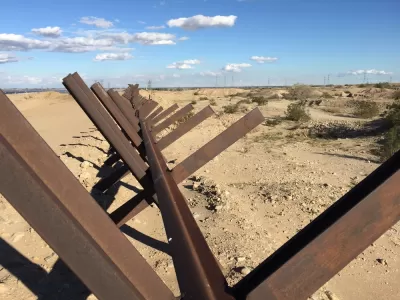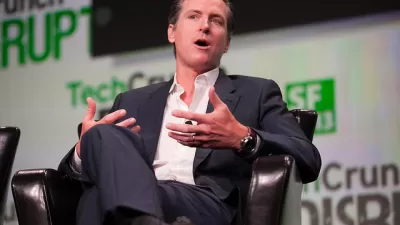The Trump administration has canceled a nearly $1 billion grant assigned to the California high-speed rail project and is attempting to get the state to return the $2.5 billion it has already spent on the $77 billion project.

President Trump, like most Republicans, has never been a fan of high-speed rail and the California project, linking Northern and Southern California via the Central Valley, in particular.
On Feb. 12, Gov. Gavin Newsom (D), the successor to Gov. Jerry Brown (D), the state's long-time champion of high-speed rail, announced during his first state-of-the-state address that "there simply isn’t a path to get from Sacramento to San Diego, let alone from San Francisco to LA. I wish there were. However, we do have the capacity to complete a high-speed rail link between Merced and Bakersfield."
"Late Tuesday [Feb. 19], a Trump administration official pointed to Mr. Newsom’s remarks as an indication that the project was too costly and would never be constructed as planned,'" report Annie Karni and Jennifer Medina for The New York Times.
Given that acknowledgment, the official said, the administration had a responsibility to taxpayers to “cancel the financial support for this boondoggle.”
Also on Tuesday, the Federal Railroad Administration issued this statement canceling the one remaining grant it has yet to award to California and announced the administration's intent to recoup previously awarded grants:
The U.S. Department of Transportation announced today that the Federal Railroad Administration (FRA) intends to cancel $929 million in Federal grant funds yet to be paid for the California High-Speed Rail project envisioned to connect the L.A. Basin to the San Francisco Bay Area.
In addition, the Department announced it is actively exploring every legal option to seek the return from California of $2.5 billion in Federal funds FRA previously granted for this now-defunct project.
Suspicious timing
Both the Times and Gov. Newsom acknowledged that the Trump administration's actions to cancel and recoup the grants came one day after California filed a lawsuit with 15 other states challenging President Trump’s emergency declaration on the border on Feb. 15.
“It’s no coincidence that the administration’s threat comes 24 hours after California led 16 states in challenging the president’s farcical ‘national emergency,’” Mr. Newsom said in a statement. “This is clear political retribution by President Trump, and we won’t sit idly by. This is California’s money, and we are going to fight for it.”
The president didn't even attempt to hide the relationship between the rail project and the border wall by linking the two in his tweet Tuesday morning.
Litigation likely
"It is unclear whether the federal government has the legal authority to withhold the grant from California, and state officials are likely to challenge the move in court," write Karni and Medina.
A 3-page letter [pdf] penned by Ronald L. Batory, Administrator of the Federal Railroad Administration, to Brian Kelly, CEO of the California High-Speed Rail Authority, indicating his intent "to de-obligate the full $928,620,000" grant appears formidable to this correspondent. He states that the Authority "has failed to provide FRA with timely and satisfactory reports."
Criticism was also targeted against the Authority in a state audit issued in November noting that their “flawed decision making and poor contract management have contributed to billions in cost overruns and delays.”
An analysis of Batory's letter by and
Related in Planetizen:
-
Gov. Gavin Newsom to Dramatically Downsize High-Speed Rail Project, February 13, 2019
FULL STORY: Trump Administration Wants California to Pay Back $2.5 Billion for High-Speed Rail

Planetizen Federal Action Tracker
A weekly monitor of how Trump’s orders and actions are impacting planners and planning in America.

Map: Where Senate Republicans Want to Sell Your Public Lands
For public land advocates, the Senate Republicans’ proposal to sell millions of acres of public land in the West is “the biggest fight of their careers.”

Restaurant Patios Were a Pandemic Win — Why Were They so Hard to Keep?
Social distancing requirements and changes in travel patterns prompted cities to pilot new uses for street and sidewalk space. Then it got complicated.

Platform Pilsner: Vancouver Transit Agency Releases... a Beer?
TransLink will receive a portion of every sale of the four-pack.

Toronto Weighs Cheaper Transit, Parking Hikes for Major Events
Special event rates would take effect during large festivals, sports games and concerts to ‘discourage driving, manage congestion and free up space for transit.”

Berlin to Consider Car-Free Zone Larger Than Manhattan
The area bound by the 22-mile Ringbahn would still allow 12 uses of a private automobile per year per person, and several other exemptions.
Urban Design for Planners 1: Software Tools
This six-course series explores essential urban design concepts using open source software and equips planners with the tools they need to participate fully in the urban design process.
Planning for Universal Design
Learn the tools for implementing Universal Design in planning regulations.
Heyer Gruel & Associates PA
JM Goldson LLC
Custer County Colorado
City of Camden Redevelopment Agency
City of Astoria
Transportation Research & Education Center (TREC) at Portland State University
Camden Redevelopment Agency
City of Claremont
Municipality of Princeton (NJ)




























